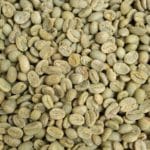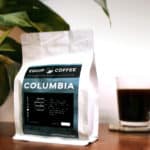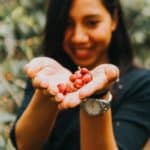WHY DOES TRACEABILITY MATTER?
Demystify common terms. Look for indicators to tell if your coffee was sourced ethically.

Does your coffee have any information about where it’s from?
Traceability – is the ability to trace all processes from procurement of raw materials to production, consumption and disposal to clarify “when and where the product was produced by whom.”
If your coffee supplier doesn’t provide the country of origin and processing method, then there is a probability that your coffee has been purchased at unethical prices. Many companies will buy the cheapest lots from across the world, obtaining deformed beans unfit for specialty coffee standards, and combine them into a ‘blend’.
(And maybe add some flavor on top, so you don’t realize its diminished quality.)
Demystifying terms.
Here are a list of words on your coffee that don’t mean what you think they do:
- Gourmet.
- This is simply referring to any bean made from Arabica coffee. Almost all palatable coffee is made from Arabica beans. There is only one major alternative, which is called Robusta, which is known to taste like burnt tires.
- Artisan.
- This means ‘high-quality brewed coffee,’ and is a term used without regulation.
- Organic.
- While the idea of purchasing organic coffee is wholesome, it puts a huge strain on coffee farmers. Why? A common ailment to coffee trees is called Coffee Rust. It is highly contagious, and if it has been known to destroy 15-75% of a crop, with the only known ailment being the use of fungicides. There are benefits to purchasing organic in general. However, by purchasing organic coffee, this encourages farmers to play a risky game in order to satisfy market desires simply for the label ‘organic’.
- Blend.
- This word can give coffee companies permission to combine low-quality lots from different countries of origin without needing to provide details.
- Classic Roast.
- Usually burnt.
- Artificially Flavored.
- Sweeteners have been added.
- Dark Roast. Light Roast, Medium Roast.
- There is no regulation on this language. (A common misconception is, however, that light roasts are weaker. In fact, light roasts have slightly higher caffeine levels.)
- Fair Trade Certified
- Your coffee farmers are required to be paid $1.40 per pound for their coffee! (Which is about the cost per bag Fair Trade asks to be paid. Not including the initial fee for the graphic on the bag. Oh–and that price hasn’t risen in over 30 years.)
- Natural, Eco, Smooth, Rich, Value, 100%…
- These words imply much, but practically mean almost nothing.

WHY TRACEABILITY MATTERS
Did you know that traceability is a great way to tell if your coffee was sourced ethically?
“In 50 countries across Africa, South America and Asia, 125 million people depend on coffee for their livelihoods. Of that group, 63% live in poverty and 71% in extreme poverty. For small-scale coffee producers, those numbers are closer to 100%.” -Global Nonprofit Heifer International
And…
According to a recently published market report from leading exporter Volcafe, nearly 61 percent of producers are selling their coffee at prices under the cost of production.
In effect, coffee farmers are now subsidizing the growth of the global coffee market. – Fair Trade America.
Most coffee is sold at 68 cents per pound, which places coffee farmers in extreme poverty.
International Fair trade is about double this – $1.40 per pound.
Even better, EQUIP purchases coffee at 3-5 times the average price of coffee, supporting ethical practices across the world.
Fair Trade coffees are a clear sign for producers towards better practices, but is still complicated – paying their sticker certification itself is $1.35 per pound, which is almost the price paid for the coffee in the first place.
Traceability is the fundamental key for the growth of the entire coffee production sector because it gives an overview, not segmented, of the entire supply chain and helps to focus on critical issues.
On the one hand, it stimulates the grower to increase his efforts and to plan his production based on the conditions of the soil, the climate, the altitude, the varieties, monitoring the production processes in order to obtain a particular aromatic profile, in which identify your production. But above all, it offers him the opportunity to establish a relationship with the user of his coffee.
On the other hand, traceability allows the user to choose a coffee based on the label that clearly describes what he is buying, according to his own aromatic and ethical choices.
The roasting process is also carried out with much more information available on the chemistry of the beans, to improve the profile in the cup and to offer single origin or blends with characteristics defined by aroma and identity. -Slow Food Coffee Coalition

